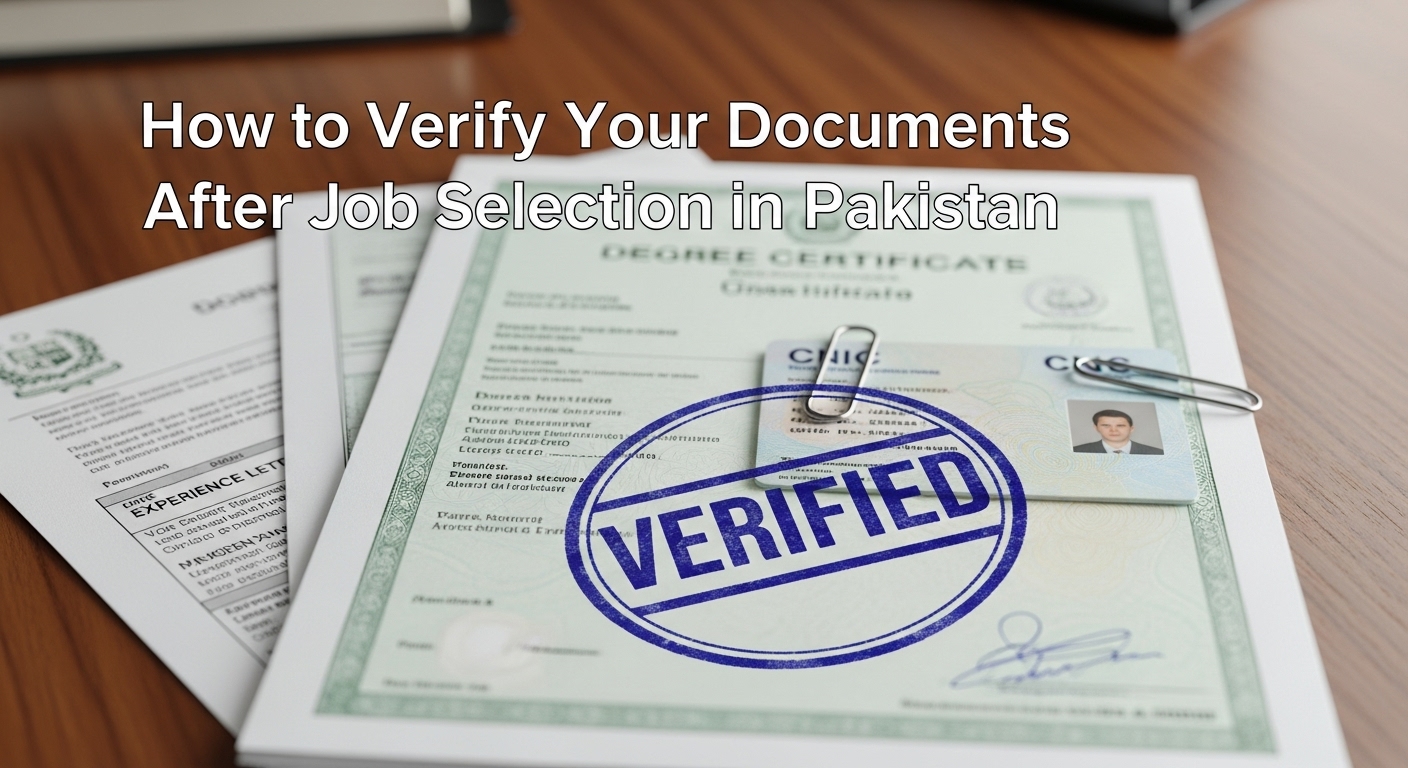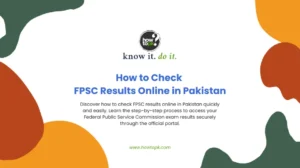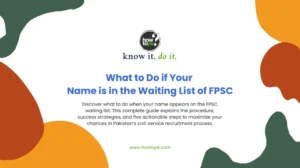Why Document Verification Matters
The document verification process after job selection in Pakistan is not just a formality. Employers—whether in the public or private sector—are bound by law to ensure their workforce has legitimate qualifications. Submitting fake or incomplete documents can lead to immediate termination, blacklisting, or even legal consequences. In government organizations, the process is especially strict, while private companies are becoming equally vigilant due to the rising cases of forged credentials.
Verification ensures fairness in recruitment, protects institutional reputation, and confirms your eligibility based on genuine records. Employers may check your certificates directly with boards, universities, or through the Higher Education Commission (HEC). They can also engage third-party agencies for background checks, extending the timeline from one week to several months, particularly for sensitive or government jobs.
Documents Commonly Required
When preparing for the document verification process after job selection, you must arrange a range of documents across categories:
Academic Documents: Matric (SSC) and Intermediate (HSSC/FA/FSc) certificates, transcripts, bachelor’s degree, master’s degree, and additional diplomas.
Personal Documents: Computerized CNIC, passport, father’s CNIC, and B-form if applicable.
Residential & Legal Documents: Domicile certificate, police verification, character certificate, affidavit, and NOC (for government employees switching jobs).
Professional Documents: Experience letters, professional licenses such as PEC (for engineers) or PMDC (for doctors), and specialized certifications.
Photographs: Recent passport-size photos on blue or white backgrounds, usually 4–12 copies.
For an authoritative checklist, you can consult resources provided by HEC Pakistan.
Step 1: Reading the Job Offer Carefully
The process begins with your selection letter. It specifies submission deadlines, attestation requirements, and whether originals or attested copies are needed. Overlooking a single instruction can cause rejection. Highlight every requirement, ask HR for clarifications in writing, and prepare documents exactly in the sequence required.
Step 2: Gathering and Organizing Documents
Start by creating a checklist. Ensure your personal details—name, father’s name, and date of birth—are consistent across all documents. Prepare at least five attested sets of photocopies, store originals safely, and scan digital backups in high resolution. If documents are lost, apply for duplicates immediately and keep acknowledgment slips as proof during verification.
Step 3: Attestation of Academic Certificates
Academic attestation is the backbone of the document verification process after job selection in Pakistan.
Matric/Intermediate: Visit your BISE office, submit originals and photocopies, pay the fee, and collect attested copies after a few days.
University Degrees: Attest from your university’s registrar/examination branch. For jobs requiring HEC attestation, register at HEC’s e-portal, upload scans, and book an appointment at a regional center.
HEC Attestation: On your appointment day, present all documents, receipts, and copies. HEC often attests the same day but may request further verification.
Private Jobs: Sometimes require attestation by a gazetted officer or notary public.
Step 4: Attestation of Other Key Documents
Besides academics, your CNIC, domicile, character certificate, and professional licenses often need attestation.
CNIC: Ensure it is valid and not expired. Photocopies must be attested.
Domicile: Issued and attested by your Deputy Commissioner’s office.
Character Certificate: Issued by your last institution or police station. Police certificates may take up to two weeks.
Experience Letters/NOC: Obtain from your previous employer. For government jobs, the NOC is mandatory.
Professional Certificates: Doctors, engineers, or accountants must have licenses attested by their respective councils.
Step 5: Submission to Employer
When all documents are ready, organize them neatly in the employer’s required sequence—usually CNIC, academic, professional, domicile, and supporting documents. Attach a cover letter listing enclosed items and submit in person or through a tracked courier. Always get acknowledgment to avoid misplacement issues.
Step 6: Handling Discrepancies
Sometimes, HR may raise queries about mismatched names, missing certificates, or inconsistencies. Respond within 24 hours with affidavits, supplementary documents, or written clarifications. If duplicates or corrections are pending, provide official proof of your application. Never attempt to provide fake documents, as this can permanently ruin your career prospects.
Tips for Smooth Verification
Start early as government procedures are slow.
Keep multiple attested copies ready.
Maintain a digital backup on secure cloud storage.
Stay in proactive communication with HR.
Record all receipts, acknowledgment slips, and correspondence.
Always remain patient and polite, even when facing bureaucratic hurdles.
Final Thoughts
The document verification process after job selection in Pakistan may seem overwhelming, but with preparation, organization, and patience, it becomes manageable. From collecting your academic transcripts to getting HEC attestation and submitting your complete file to HR, each step ensures your professional journey begins on the right note. By starting early, staying proactive, and maintaining transparency, you can navigate the process smoothly and secure your dream job without unnecessary setbacks.
For further guidance on attestation, you can explore NADRA and HEC Pakistan official resources.
FAQs About Document Verification After Job Selection
What is document verification after job selection?
It is the process where your employer checks if your educational, personal, and professional documents are real and match what you claimed in your job application.Why does my employer need to verify my documents?
Verification ensures you truly meet the job’s requirements and helps the employer avoid hiring someone with fake or incorrect documents.What documents are usually checked during verification?
Generally, your educational certificates (Matric, Inter, degrees), CNIC, domicile, character certificate, experience letters, and sometimes additional certificates or NOCs.Do I have to submit original documents or photocopies?
Usually, you need to submit attested photocopies but show your original documents for inspection.What does “attested documents” mean?
Attested documents have been officially verified and stamped by an authorized person (like a gazetted officer or your education board/university).Who can attest my documents?
A gazetted officer (BS-17 or higher), a notary public, your school/college principal, or an authorized officer from your education board or HEC.How do I get my degrees attested by HEC?
Create an account on the HEC website, fill out your details, book an appointment, pay the fee, and visit the HEC office with all originals and copies as well as your fee receipt.How do I attest my Matric and Intermediate certificates?
Go to your local BISE (Board of Intermediate and Secondary Education) office with your original certificates, copies, and a small fee.My name is spelled differently on two documents. What should I do?
You need to get your documents corrected by the issuing authorities. You may also write an affidavit explaining the difference for the time being.What if I have lost a certificate or document?
You must file a police report (FIR), apply for a duplicate from the issuing board or authority, and inform your employer of the situation.Can I join my job if my verification is still pending?
Sometimes, yes—if you show proof that you’ve started the verification process and explain the reason for the delay. Ask your employer for written permission.What should I do if the employer says my documents are not correct?
Reply quickly, provide any extra proof you have (like B-form, old certificates), and if needed, start the correction process with the issuing authority.How long does the document verification process take?
It can take anywhere from a few days to several weeks, depending on the number of documents and how quickly government offices process them.What is a domicile and why is it needed?
A domicile certificate proves which city or province you belong to. It’s needed for almost all government jobs and many private ones.How can I get a character certificate?
Get it from your last school or college, or from your local police station. Some organizations need both.What is an NOC, and who needs it?
An NOC (No Objection Certificate) is needed if you are already working in a government job and want to join a new one. Get it from your current department.What if my CNIC is expired or damaged?
Apply for a renewal or duplicate CNIC at the nearest NADRA office as soon as possible.Can I give color-scanned documents instead of photocopies?
Most places require printed, attested photocopies. Only give digital scans if specifically asked by the employer.Do I need to attest every page of my mark sheets and degrees?
Yes, each page or separate document should be attested individually unless your employer says otherwise.Who pays for the attestation fees?
You pay for all attestation and document correction fees yourself.How many copies of each document should I prepare?
Prepare at least 5 attested copies of each document; your employer will usually ask for 1–3 sets, but it’s good to have extras.What if I cannot get an attested copy in time?
Immediately inform HR in writing and send proof (like an application slip or appointment letter) that your request is in process.Can my documents be rejected after joining the job?
Yes, if verification later finds your documents are fake or incorrect, your job offer can be canceled, and you may even face legal action.My documents were submitted but HR says they didn’t receive them. What do I do?
Show your submission receipt, email, or courier tracking as proof. Always keep receipts and copies of all submissions.Do I need to verify my documents again if I switch jobs?
Yes, most employers will verify your documents again, even if they were verified by a previous employer.Will my employer contact my university or board directly?
They might, especially for degrees and certificates. Some use third-party companies for this step.Is online verification enough?
No, most employers in Pakistan require physical, attested documents, though some may also check online for degrees.Are photocopies of attested documents acceptable, or do I need fresh attestation each time?
You often need fresh attestation for each new submission, especially for government jobs.What if I studied abroad? How do I get my degrees verified?
Get your degrees attested by the Pakistani embassy in that country, then by the Ministry of Foreign Affairs (MOFA) in Pakistan, and finally by HEC.Can someone else submit or collect my documents on my behalf?
Usually, yes, if you give them an authority letter with your signature and a copy of your CNIC. Always confirm this with your employer first.










